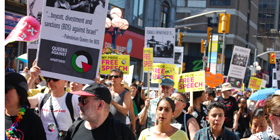Toronto City councillor Giorgio Mammoliti’s motion to defund Pride Toronto (PT) as punishment for its decision to rescind its ban on the words “Israeli apartheid” in Toronto’s Pride parade passed at city council today after a vote of 36-1. But the motion was changed significantly before it came to a vote.
It reads:
1. City Council direct that funding for Pride Toronto be paid after the parade and be conditional upon Pride Toronto requiring all registered participants to comply with the City of Toronto’s Anti-Discrimination Policy (read the policy here – PDF).
2. City Council request the City Manager to advise Pride Toronto on what is required of them to meet the Policy.
3. City Council request the City Manager to advise Pride Toronto whether the participation of QAIA and the signs or banners they carry contravenes the City’s Anti-Discrimination Policy.
(Full text of the motion and the votes can be viewed here)
That means that funding for PT’s 2010 celebration won’t be clawed back and that the matter is closed at least for this year. For next year, the onus for interpreting the city’s antidiscrimination policy, for making the determination whether or not the presence of Queers Against Israeli Apartheid in Toronto’s Pride parade violates that policy, will fall to the city manager’s office. Also, PT will get its city money after future Pride celebrations rather than before, as is the case now.

Xtra talked with PT executive director Tracey Sandilands after the vote. She said she is relieved by the outcome. She said that getting city funding after the parade in the future is a bit of an inconvenience, but that she’s happy PT isn’t on the hook for interpreting the city’s antidiscrimination policy. She said she believes PT was always in compliance with city policy.
Although a significant victory for Toronto’s gay communities, the move does come with some risks. For example, those opposed to QuAIA’s presence in the Pride parade now know precisely where to target their lobbying efforts: the city manager’s office. If those lobbyists are successful over the course of the next few months, gay people may have to deal with QuAIA censorship issues again next year. But there’s nothing in Canadian jurisprudence to suggest that criticism of the Israeli government is discriminatory. So it seems implausible that city managers could reasonably make that determination. At any rate, for now the ball rests firmly in the courts of the anti-QuAIA lobby and the city manager’s office.
QuAIA has always maintained that the presence of its contingent does not breach the city’s policy. After announcing it would ban the term “Israeli apartheid” on May 25, Pride Toronto rescinded the ban on June 23, less than two weeks before the parade on July 4.
Mammoliti’s original motion demanded retroactive repayment of city grants to Pride Toronto for the 2010 celebration as punishment for Pride Toronto’s decision to rescind its ban on the term “Israeli apartheid.”
Sandilands also told Xtra that despite a relatively successful Pride celebration this year, she anticipates that PT will have a deficit of at least $100,000.
We’ll have more later.
>> Free speech at Pride: Read all of Xtra’s coverage in one place
 Why you can trust Xtra
Why you can trust Xtra


